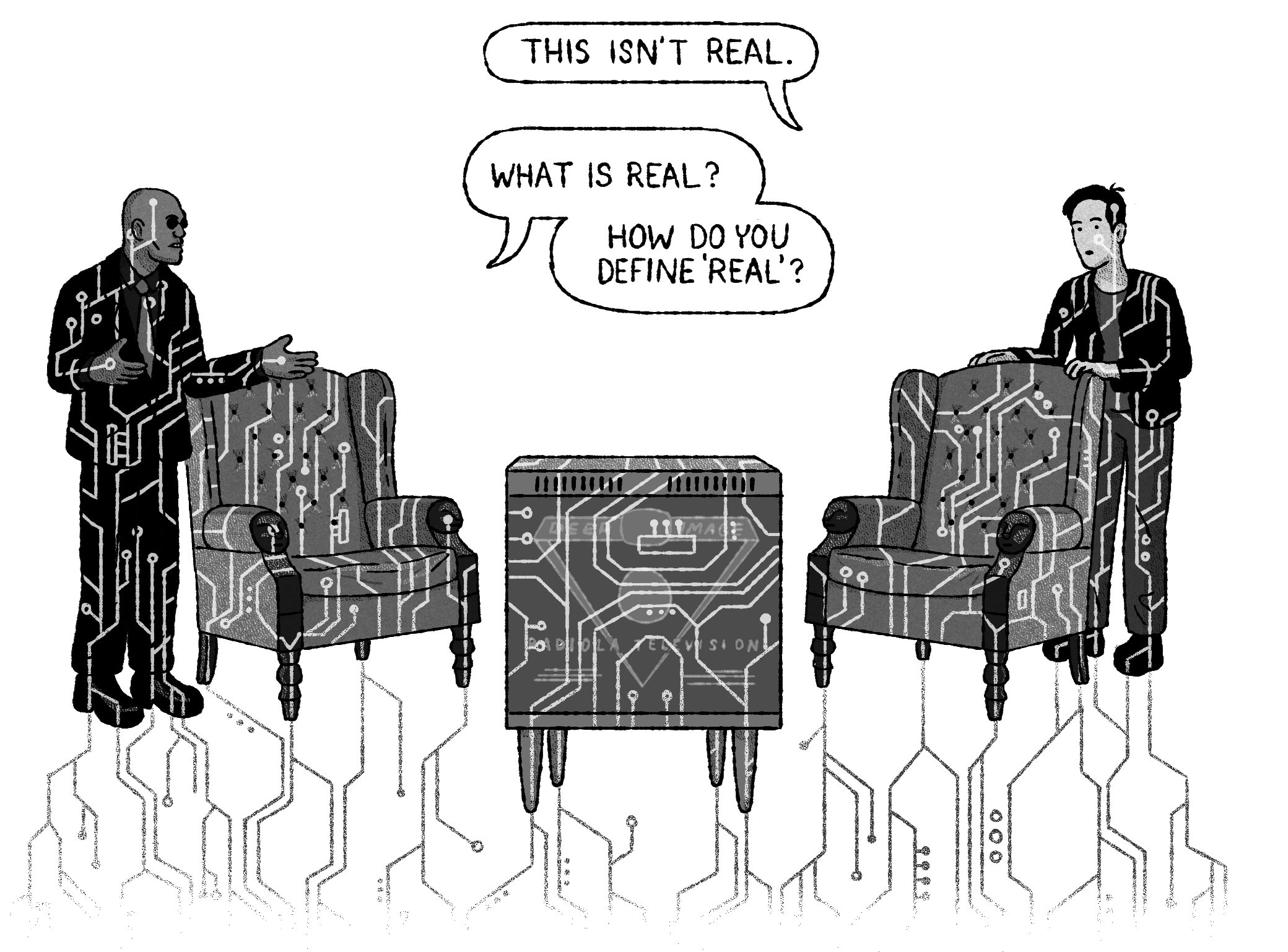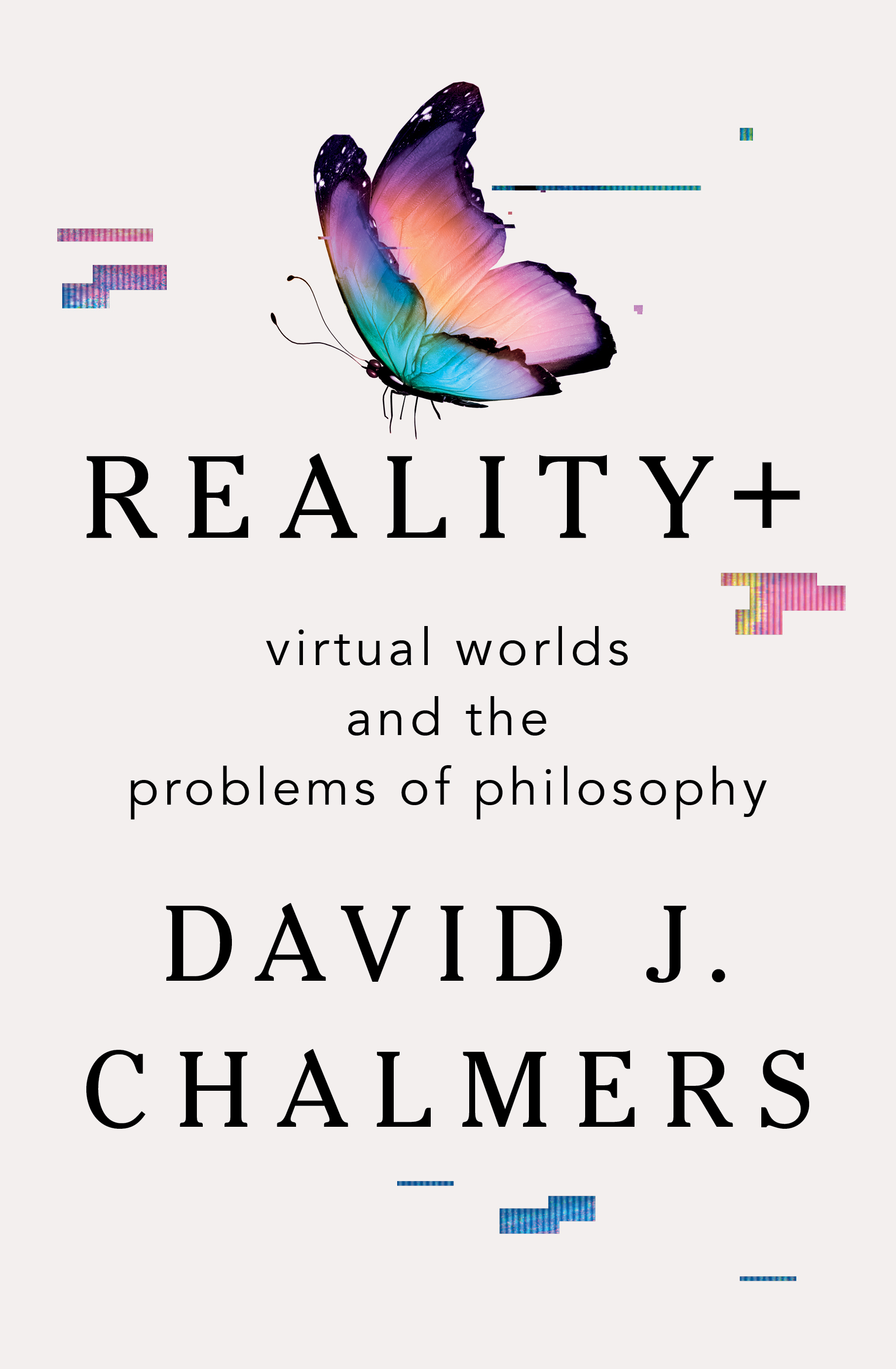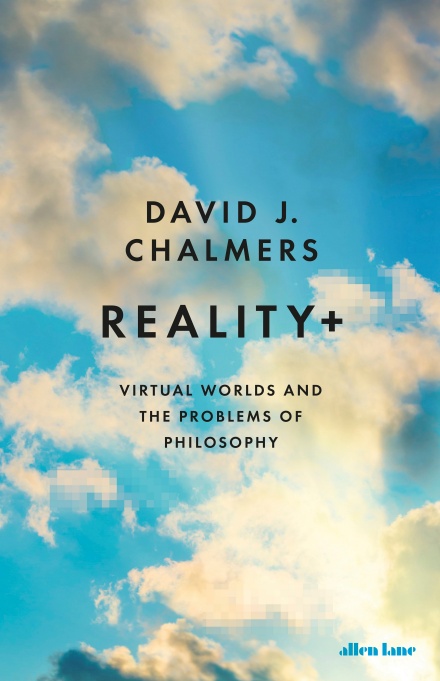reality+
Reality+: Virtual Worlds and the Problems of Philosophy was published by W. W. Norton (US) and Allen Lane (UK) on January 25, 2022. [Information: Norton, Allen Lane, and Amazon.]
Excerpt: the introduction and chapter 1.
Reality+ is my name for the universe of virtual and nonvirtual worlds. You can think of Reality+ as physical reality combined with the metaverse of augmented and virtual realities, perhaps along with a multiverse of alternative realities, simulated and otherwise.
The central thesis of the book is virtual reality is genuine reality. This applies both to full-scale simulated universes, such as the Matrix, and to the more realistic virtual worlds of the coming metaverse.

Simulated universes: The Matrix. I first argue that we can’t know we’re not in a simulation like the Matrix. This is a modern-day version of Rene Descartes’s idea that we might be in the grip of an evil demon producing sensations of an external world. These ideas have led some philosophers to say that we can’t know anything in the world around us is real. But I argue that even if we’re in a simulation like the Matrix, the world around us is perfectly real. There are still tables and chairs, planets and people. If I’m right, a simulation is an “it-from-bit” world where real objects are made of digital processes. This idea helps us to address Descartes’ puzzle of how we can know anything about the external world.

Real virtual reality: The metaverse. I argue that in principle we can lead meaningful lives inside metaverse-style virtual worlds. These worlds needn’t be illusions, hallucinations, or fictions. Our time in them needn’t be escapism. People already lead complex and meaningful lives in virtual worlds such as Second Life, and VR will make this commonplace. I’m not predicting that VR will be a utopia. It poses many dangers and challenges, including the challenge of a corporation-dominated metaverse where corporations serve as the all-powerful and all-knowing gods who create the virtual worlds. (Yes, that’s Mark Zuckerberg in Plato’s cave above.) Like the internet, the metaverse will certainly lead to wonderful things and to awful things. But philosophically, I think it has room for the full range of the human condition.

The problems of philosophy. I use virtual worlds to introduce and address some of the oldest and deepest problems in philosophy. Is there a God? What is the relationship between mind and body? What is reality? How can we lead a good life? How can we build a just society? Thinking about virtual worlds illuminates all of these questions, and transforms some of them. Along the way, you’ll receive an introduction to many areas of philosophy. (The book can easily be used as a textbook in introductory courses and other courses in philosophy.)
All this yields the two-way interaction between technology and philosophy that I call technophilosophy: philosophy helps us to come to grips with new questions about technology, and technology helps us to shed light on ancient questions in philosophy.
The book also contains 57 amazing illustrations by Tim Peacock, three of which are shown above. The chapter 1 excerpt also has four of them: Zhuangzi’s butterfly dream, Narada’s transformation a la Rick and Morty, Mark Zuckerberg running Plato’s cave, and Cornel West on illusions in the Matrix.
Extra material: For people who are reading the book or who have read it, this website includes some extra endnotes and appendices, typically covering more technical matters that may not make sense without the book itself. For academic philosophers, I also have a guide to teaching with Reality+. More coming soon!
Media
- Can we have a meaningful life in a virtual world? (David Marchese, New York Times Magazine)
- Reality check: Could our universe be a simulation? (Bryan Appleyard, The Spectator)
- Virtual reality is reality, too (Sean Illing, Vox)
- “Virtual reality is genuine reality” so embrace it, US philosopher says (Ian Sample, The Guardian)
- The near and far out: Virtuality, extended minds, and Reality+ (John Brady and Timofei Gerber, Epoché)
- What a veteran VR philosopher thinks of the metaverse (Mathew Olson, The Information)
- How real could virtual reality become? (Evan Selinger, Boston Globe)
- We might be living in a simulation. How much should that worry us? (Farhad Manjoo, New York Times)
- David Chalmers: “I’d love to come back every 100 years to take a look” (Sophie McBain, New Statesman)
- The simulated world according to David Chalmers (Dan Falk, Nautilus)
- Virtual reality is as real as real reality (Richard Webb, New Scientist)
- Exploring mind-bending questions about reality and virtual worlds via The Matrix (Jennifer Ouellette, Ars Technica)
- David Chalmers on Reality+ (Paul Doolan, Philosophy Now)
- Can you have a meaningful life in the metaverse? (Amy Francombe, Evening Standard)
- Exploring the simulation (Dana Wormald, New Hampshire Bulletin)
- Unfortunately we are not living in a simulation (Nathan Robinson, Current Affairs)
- Where simulation ends and reality begins (Julian Baggini, Prospect)
- Philosopher: We can’t prove we’re not living in a simulation (Mind Matters)
- Lunch in VR: ‘We are the gods of the virtual worlds we create (John Thornhill, Financial Times)
- The man rethinking the definition of reality (Tom Chatfield, BBC Future)
- Of course we’re living in a simulation (Jason Kehe, WIRED)
- Lost in a metaverse of virtual reality (Paul Thagard, Psychology Today)
- Living simulations (Mark Pesce, Cosmos)
- The metaverse isn’t a destination. It’s a metaphor (Scott Stein, Cnet)
- Are we living in a simulation? Look to Free Guy, not The Matrix, for answers, says David Chalmers (CBC Tapestry)
- Design for the real world (Fredrik Hellberg and Lara Lesmes, Disegno)
Reviews
- Publishers Weekly: “An object lesson in philosophical reasoning and a bold, often awe-inspiring discussion of its implications.”
- Financial Times (John Thornhill): “Scintillating, startling, and sometimes outlandish”
- The Times (Kit Wilson): “A sprawling, brain-tenderising beast of a book — but a hugely entertaining one at that.”
- The Sunday Times (Josh Glancy): “The most alarming and thought-provoking book I’ve read in years… A dangerous manifesto for the future of humanity.”
- The Guardian (P. D. Smith): “I was surprised to find his arguments delightfully – or perhaps worryingly – convincing … A brilliant and very readable philosophical investigation.”
- The Times Literary Supplement (Kieran Setiya): “Outside of ethics, Chalmers is a joy: an exuberant guide through challenging terrain, quick with anecdotes and arguments, wit and wild ideas.”
- Irish Times (Joe Humphreys): “Have you ever read a book that gets under your skin not because you loved it but because it makes an argument so seemingly preposterous that you recoil from it?”
- City Journal (Paul Dicken): “An excellent introduction to the big questions of philosophy—and also an enthusiastic endorsement of our high-tech future.”
- Science (John Zerilli): “[An] intriguing and entertaining romp through philosophy… Chalmers cuts a Gordian knot in writing both accessibly and illuminatingly.”
- New Atlantis (David Bentley Hart): “An essential triviality in its topic — whether minds can exist in virtual worlds — which is nothing more than a beguiling category-error compounded from equal parts bad philosophy and bad science.”
- Washington Post (Jess Keiser): “Like Hofstadter’s work, “Reality+” is frequently weird, wild and wonderful; it captivates the common reader by refusing to condescend.”
- New Statesman (Bruno Maçães): “Reality+ could not be timelier…[Chalmers] is like a migrant who, on arriving at a new neighbourhood in a new country, immediately proceeds to make it look exactly like home.”
- WIRED (Jason Kehe): “The paradox of Chalmers’ “simulation realism,” in fact, is that, once you embrace it, …, so many isms that in modern times have been dismissed as mystical, supernatural—dualism, panpsychism, animism—here find themselves reenchanted, imbued with a profound new vitality.”
- Tricycle (Jordan Quaglia): “I found Reality+ to be a riveting, mind-stretching, wakeful read, one I recommend to anyone fractionally interested in topics such as virtual reality, augmented reality, or our looming omni-cyber-meta-verse.”
- The Philosopher (Tim Crane): “David Chalmers’ new book is a tour de force. … Readable, effortlessly up to date, handsomely produced, and well structured, Reality+ will be a boon for teachers of introductory philosophy courses and is sure to remain on syllabuses for many years.”
- Morning Star (Andy Hedgecock): “Encyclopaedic in scope, leisurely in pace and based on carefully developed explanations, this is the perfect starting point for those with an interest in the possibilities of immersive technology.”
- Philosophy (Yuval Avnur): “Some philosophers are purists, thinking that the problems of philosophy float above the world of changing empirical circumstances. In Reality+, David Chalmers demonstrates the untenability of this purism by showing that technology raises new philosophical questions and changes old ones.”
Podcasts/Conversations
- Living in the Matrix (Tom Sutcliffe, BBC4 Start the Week)
- The Matrix Resurrections (Justin and Laura Khoo, Cows in the Field)
- Are we living in a simulation? (Sean Illing, Vox Conversations)
- Reality+ may change how you see reality (Kent Bye, Voices of VR)
- Virtual reality, simulation hypothesis, and the Metaverse (Riz Virk, The Simulated Universe)
- David Chalmers on Reality+ (Lucas Perry, Future of Life Institute)
- Are We Living in a Simulation? (Keith Frankish and Philip Goff, Mind Chat)
- David Chalmers says virtual reality is reality (Brendan O’Connor, RTE Radio 1 Ireland)
- Is virtual reality…real? (Adam Conover, Factually)
- David Chalmers on Reality+ (Kyle Maguire and John Wells, Cool Science Radio)
- The metaverse, virtual worlds, and the problems of philosophy (Demetri Kofinas, Hidden Forces)
- Reality+ (Sam Hankin, Avid Reader Show)
- The simulation hypothesis (Brian Keating, Into the Impossible)
- Professor David Chalmers (Frank Morano, The Other Side of Midnight, WABC New York)
- The simulation hypothesis (Freddy Drabble, Chasing Consciousness)
- Live from the table (NYC Comedy Cellar)
- Is reality real? This scientist’s answer might shock you (Tom Bilyeu, Impact Theory)
- What is the metaverse (Luke Gbedemah, Tortoise)
- The origins of the metaverse (Colin Harvey, BBC Radio 4)
- Confronting the “realness” of our reality (Mary Hynes, CBC Radio: Tapestry)
- Reality+: Virtual worlds and the problems of philosophy (The Michael Shermer Show)
- Are we living in a simulation? (Rufus Griscom, The Next Big Idea)
- The meaning of life in the metaverse (Azeem Azhar, The Exponential View)
- David Chalmers on virtual worlds and the problems of philosophy (Robert Kuhn, Closer to Truth)
- What is the metaverse? (Tony Dokoupil, CBS Mornings Podcast)
- David Chalmers interview on his book Reality+ (Ariel Valdez, Kinokuniya Bookstore NYC)
- Are we living in a simulation? (Coleman Hughes, Conversations with Coleman)
- David Chalmers on AI and consciousness (Daniel Bashir, The Gradient Podcast)
- David Chalmers on the nature of reality (Vasant Dhar, Brave New World)
- David Chalmers on virtual reality and the simulation argument (Mark Oppenheimer, Brain in a Vat)
- The digital self and online identity (Antony Funnell, ABC Radio Future Tense)
- David Chalmers on the future of reality (Alice McCrum, American Library in Paris)
- What’s the difference between the virtual reality of cyberspace and “real life”? (Andrew Keen, Keen On)
- Reality+: Virtual worlds and the problems of philosophy (Paul Borrill et al, Clubhouse: It’s About Time)
- How real is virtual reality? (Wendell Wallach, AI and Equality Podcast)
Excerpts/Tie-ins
- Adventures in technophilosophy: On the reality of virtual worlds (Lit Hub)
- Can we prove the world isn’t a simulation? (Nautilus)
- What should be considered a crime in the metaverse? (Wired)
- Our virtual lives are real lives (New York Times)
Videos
- Philosopher David Chalmers breaks down the philosophy of simulations in film & TV (Penguin)
- Reality+: From the Matrix to the metaverse (NYC Media Center)
- On the philosophy of virtual worlds (Center for Human Imagination)
- From the Matrix to the metaverse (DigitalFUTURES AI/Architecture Group)
- Virtual worlds and the problems of philosophy (with Tim Crane and Andrew Lee, The Philosopher)
- The possibilities and limitations of virtual worlds (with Tony Dokoupil, CBS Mornings)
- Virtual lunch with the FT (with John Thornhill, Financial Times)
- VR Conversation with Albert Einstein (XR for the People)
“Book tour” schedule (mostly online live events, “*” denotes in person):
- January 25, 2pm EST/7pm GMT: Royal Institution
- January 26, 1:30pm EST/6:30pm GMT: How To Academy
- January 27, 8pm EST: Center for Human Imagination
- January 30, 10:30am GMT: BBC Channel 4 Sunday Brunch
- February 1, 6:45pm EST: Smithsonian
- February 2, 11am EST: NYC Media Lab
- February 6, 10am EST/3pm GMT: Digital Futures
- February 8, 2pm EST/7pm GMT: The Philosopher
- February 9, 4pm EST: Stevens Institute of Technology
- February 10, 1pm EST/6pm GMT: New Scientist
- February 12, 11am EST/4pm GMT: HowTheLightGetsIn Winter Revel
- February 16, 1pm EST/6pm GMT: Codex Metaverse Panel
- February 17, 5pm EST: Cornell University Kretzmann Lecture
- *March 1, 4pm EST: University of Georgia
- March 2, 7pm EST: Comedy Cellar: Live From the Table
- *March 3, 1pm EST: Cornell Tech Digital Life Initiative
- March 9, 2:30pm EST/7:30pm GMT: Wigtown Book Festival
- March 10, 1:30pm EST/6:30pm GMT: Tortoise Thinkin
- *March 11: Brandeis University
- March 15, 2:30pm EST/7:30pm GMT: University of Sussex
- *March 25: Princeton University (Psychology)
- *March 28-29: Yale University
- March 31: Glasgow Augmented Reality Group
- April 6: University of Rochester
- April 7: Norton Webinar: Teaching with Reality+
- April 8: Peking University AI Conference
- *April 12: Kinokuniya Books, NYC
- *April 22: Tucson Consciousness Conference
- April 30: North Carolina Philosophy and Psychiatry Conference
- May 4: Sprague and Taylor Lecture, Brooklyn College
- *May 5: California State University, Los Angeles
- May 17: On Being Human group, University of Toronto
- May 18: Carlson and Richardson Lectures, Weill Cornell Medicine, NYC
- *May 26: Federal University of Rio de Janeiro
- *June 4: Alcor Conference, Scottsdale
- June 13: XR for the People, Israel
- *June 20: Australian Catholic University, Melbourne
- *June 21: Monash University
- *June 24: University of Adelaide
- *July 5: American Library in Paris
- July 7-8: Czech Academy of Sciences, Prague

